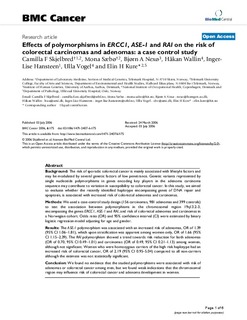| dc.contributor.author | Skjelbred, Camilla Furu | |
| dc.contributor.author | Sæbø, Mona | |
| dc.contributor.author | Nexø, Bjørn Andersen | |
| dc.contributor.author | Wallin, Håkan | |
| dc.contributor.author | Hansteen, Inger-Lise | |
| dc.contributor.author | Vogel, Ulla | |
| dc.contributor.author | Kure, Elin H. | |
| dc.date.accessioned | 2007-06-26T11:18:25Z | |
| dc.date.accessioned | 2017-04-19T13:40:21Z | |
| dc.date.available | 2007-06-26T11:18:25Z | |
| dc.date.available | 2017-04-19T13:40:21Z | |
| dc.date.issued | 2006-07-03 | |
| dc.identifier.citation | BMC Cancer 6(2006), No. 67 | |
| dc.identifier.issn | 1471-2407 | |
| dc.identifier.uri | http://hdl.handle.net/11250/2439249 | |
| dc.description.abstract | BACKGROUND: The risk of sporadic colorectal cancer is mainly associated with lifestyle factors and may be modulated by several genetic factors of low penetrance. Genetic variants represented by single nucleotide polymorphisms in genes encoding key players in the adenoma carcinoma sequence may contribute to variation in susceptibility to colorectal cancer. In this study, we aimed to evaluate whether the recently identified haplotype encompassing genes of DNA repair and apoptosis, is associated with increased risk of colorectal adenomas and carcinomas. METHODS: We used a case-control study design (156 carcinomas, 981 adenomas and 399 controls) to test the association between polymorphisms in the chromosomal region 19q13.2-3, encompassing the genes ERCC1, ASE-1 and RAI, and risk of colorectal adenomas and carcinomas in a Norwegian cohort. Odds ratio (OR) and 95% confidence interval (CI) were estimated by binary logistic regression model adjusting for age and gender. RESULTS: The ASE-1 polymorphism was associated with an increased risk of adenomas, OR of 1.39 (95% CI 1.06-1.81), which upon stratification was apparent among women only, OR of 1.66 (95% CI 1.15-2.39). The RAI polymorphism showed a trend towards risk reduction for both adenomas (OR of 0.70, 95% CI 0.49-1.01) and carcinomas (OR of 0.49, 95% CI 0.21-1.13) among women, although not significant. Women who were homozygous carriers of the high risk haplotype had an increased risk of colorectal cancer, OR of 2.19 (95% CI 0.95-5.04) compared to all non-carriers although the estimate was not statistically significant. CONCLUSION: We found no evidence that the studied polymorphisms were associated with risk of adenomas or colorectal cancer among men, but we found weak indications that the chromosomal region may influence risk of colorectal cancer and adenoma development in women. | |
| dc.description.abstract | Kolorektal cancer er assosiert med livsstil. Risikoen modifiseres av flere genetiske faktorer, hver enkelt med til dels svak gjennomslagskraft. I stedet for å undersøke enkelte (svake) "single nucleotide polymorphisms" (SNP), kan en ved haplotypeanalyse få med en rekke nært beslektede markører. I denne studien så en på en slik høy-risiko haplotype (ERCC1, ASE-1 og RAI) i kromosom 19. Det ble ikke funnet noen signifikante assosiasjoner mellom kolorektal neoplasi og polymorfismer i den undersøkte kromosomregionen, bare en svak trend for kolorektal cancer og adenomer hos kvinner. | |
| dc.language.iso | eng | |
| dc.publisher | BioMed Central | |
| dc.subject | Colorectal cancer | |
| dc.subject | Genetics | |
| dc.subject | Adenoma | |
| dc.subject | Risk factors | |
| dc.subject | Carcinoma | |
| dc.title | Effects of polymorphisms in ERCC1, ASE-1 and RAI on the risk of colorectal carcinomas and adenomas: a case control study | |
| dc.type | Journal article | |
| dc.type | Peer reviewed | |
| dc.description.version | Published version | |
| dc.subject.nsi | 714 | |
| dc.subject.nsi | 762 | |
| dc.identifier.doi | http://dx.doi.org/10.1186/1471-2407-6-175 | |
